Capitalizing on New Tech to Grow Our Apparel Business to
$1,000/mo
Hello! What's your background, and what are you working on?
Hey, I'm Julian. I'm originally from Bulgaria and currently live in Amsterdam, the Netherlands. I am one half of the team behind DULO, where we make dress shirts from performance fabrics, that deliver time, confidence, and peace of mind. Our goal is to eliminate the friction in taking care of a dress shirt by using modern materials. Current non-iron shirts are default 100% cottons shirts with a chemical finish, which washes away.
The DULO shirt is forever:
- 4-way stretch
- Non-iron and wrinkle resistant
- Machine washable
- Antibacterial (silver ions treatment)
- Responsibly made in Europe
The company is completely bootstrapped and self-funded. It's a 50/50 partnership between me and Marin, a high school classmate of mine who then became a colleague. I kinda know the guy. We have a saying in Bulgaria (which doesn't translate that well, but you'll get the point): "A known devil is half a devil." Hence jumping into this with Marin seemed like a good idea and luckily, it still does. ;)
We are both based in Amsterdam and working as full-time programmers during the day and dedicating time on DULO in the mornings, evenings, and weekends for the past year and a half.
In November 2017, about a year into product development, we launched our web store and have made around $3,000 for our first three months of operation.
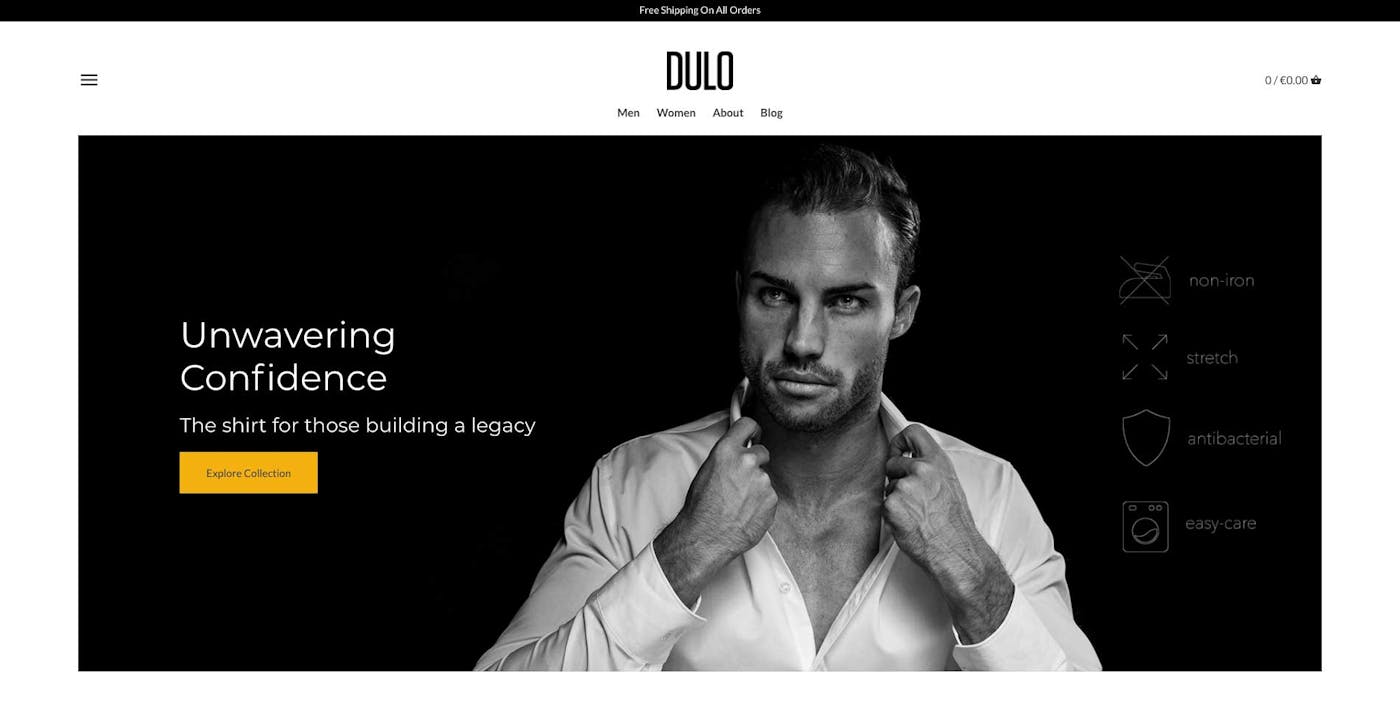
What motivated you to get started with DULO?
I always liked the idea of wearing dress shirts more often, but every one I bought I usually only wore a few times. Eventually, the fact that I had to schedule time in the morning or weekend to iron the shirts broke down my enthusiasm and made me revert back to a more practical (AKA less formal) wardrobe.
We were aware of some companies in the US making dress shirts from sports fabrics and were quite intrigued, but never ended up purchasing due to the import duties and delivery costs. But the value proposition (using modern tech to combine style with convenience) stayed in the back of our minds.
During a trip back to Bulgaria, Marin ended up at a presentation about a local company that produces and sells T-shirts. We had no previous experience in anything close to apparel production, but it made him think of the advantages we had in terms of expertise and traditions in tailoring, being from Bulgaria. That realisation, combined with the motivation to make the product we ourselves had always wanted, manifested in an idea to use the advantages of our home turf and try to produce it.
We've talked about starting our own business many times throughout the years, but for some reason, once Marin shared the idea it immediately resonated with me strongly. I could see the upsides of such a product, knew there were companies growing in the sector (proving there was a market), and we had the potential advantage of finding a partner and leverage their expertise. It made sense on paper.
Not only did we see this shift from cotton to performance fabrics in the sports industry, but we predicted (and still predict) it would become a trend in casual and formal wear, hence our confident bet on this product category.
What went into building the initial product?
Once we decided to pull the trigger on this idea we started compiling a list of companies we could contact and ask whether they would be able to create the product for us. It was a very strange start, as we didn't even know who or what we were looking for. Did we need to find the fabric itself, or did we need to talk to the manufacturers of normal cotton shirts? Or perhaps someone who could take care of both?
Many of the companies on the list didn't have a website, so we decided to filter the ones that did, asking whether they could produce a dress shirt out of sports materials. Nearly all of the companies we contacted had no idea what we were talking about, and a few said, "Maybe." But given that we also didn't have much of a clue, we decided to book a few appointments back home. Then we planned the trip and were off talking to people who could hopefully provide more clarity on whether it was even a viable business idea.
Most of the companies we talked to were a bit confused as to what we were trying to do, but the conversations we had began to acquaint us with the industry, and we starting finding some answers. There was only one company that stood out (they had a proper office instead of a caravan or a rented apartment), and they were intrigued by the idea and said they could create a sample of what we were looking for. We didn't have any other options, so we decided to shake hands and work on a sample to see how it went and take it from there.
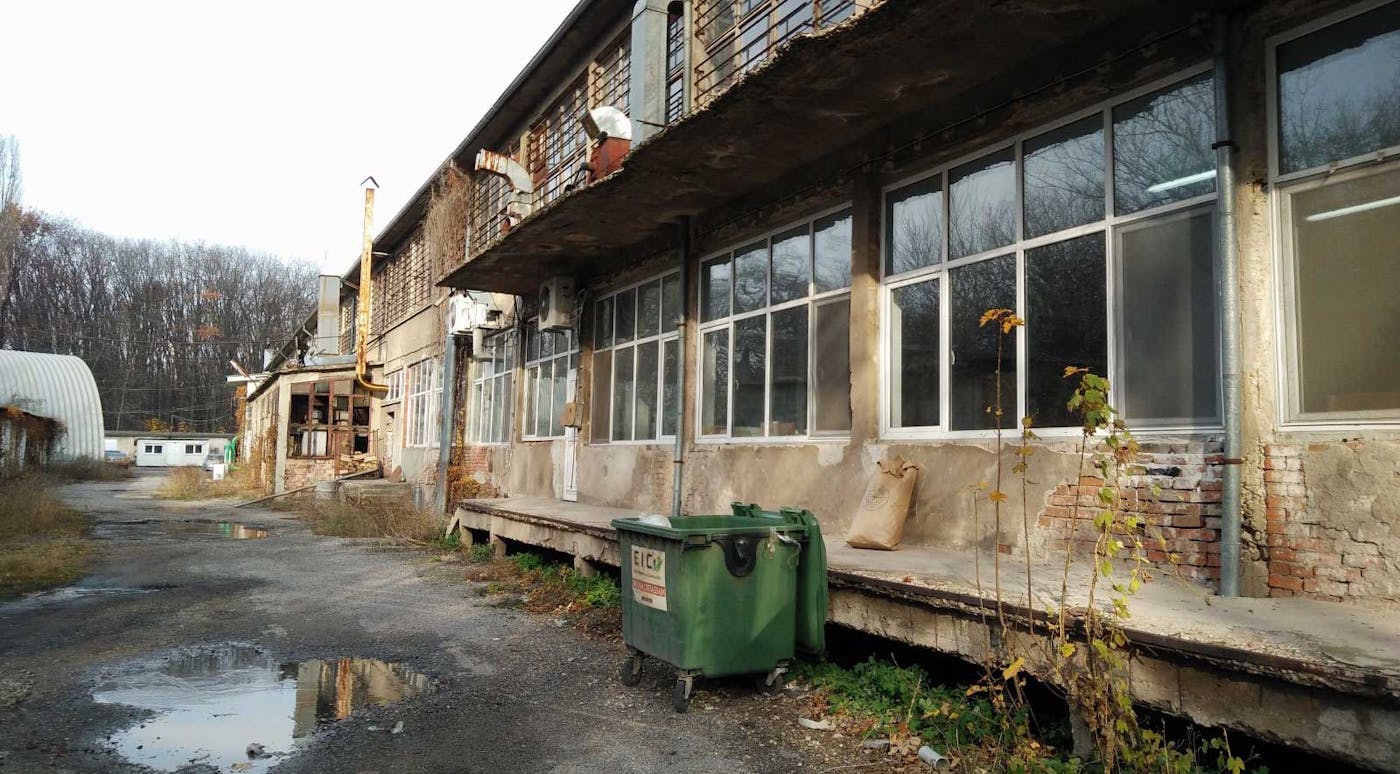 Our very first meeting looking for a manufacturing partner was in the white caravan at the back
Our very first meeting looking for a manufacturing partner was in the white caravan at the back
Fast forward a few months. We had a meeting to check the samples and were super excited to finally see a physical product. Besides the shocking yellow color, the fabric seemed great and had the exact properties we were looking for. It even felt softer than cotton on touch.
We made some adjustments to the fitting based on personal preferences and decided to create a few rounds of prototypes that we could test ourselves and give out to friends and family to test as well. After about three rounds of improvements — mainly to the fit, as we felt confident in the fabric — we decided to produce our first collection in six solid colors, both for men and women.
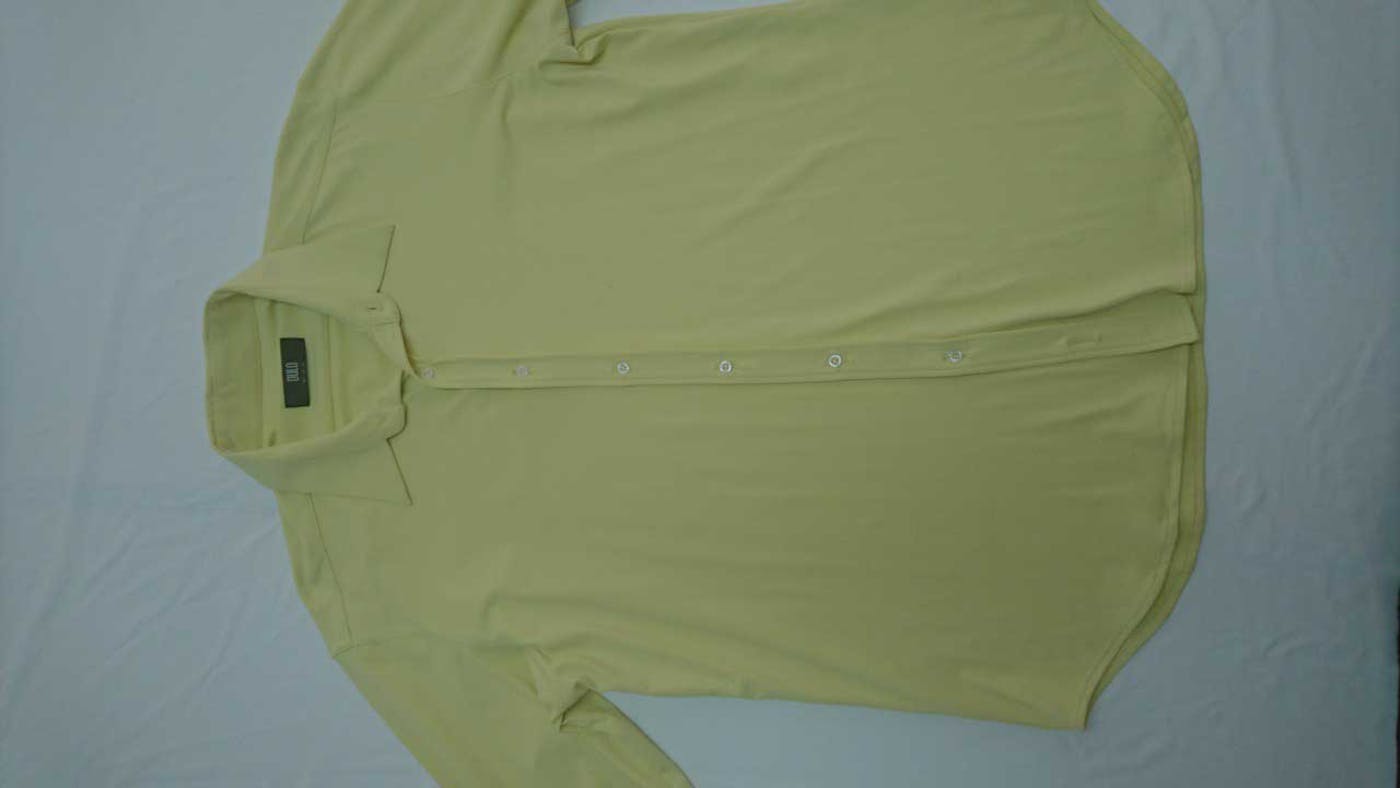 For some reason the fabric mill had the sample fabric available in yellow
For some reason the fabric mill had the sample fabric available in yellow
How have you attracted users and grown DULO?
Documenting our journey helped us have a small audience prior to and at launch. Also, some of the people that were following our journey received samples and were looking forward to buying from the first official collection, which was a very important data point for us. Even though we ourselves were very happy with the final product, it reassured us that other people also liked it after testing the prototypes.
Since our launch, we have mostly sold through word of mouth, with small budgets behind Facebook Ads, mainly for testing purposes. We've also been creating a lot of content in audio, video, and text, and also actively engaging with other people on Medium, Quora, IH, and Instagram.
We are still in the testing phase of our digital marketing but have really found value in thinking about this whole process by taking it one person at a time. Every day, consistently, having conversations with people about who we are and what we are doing, getting the word out there.
We've seen early signs of success that our story is not a typical one: two programmers starting an apparel company. It's an interesting narrative angle that we are trying to use to create interest around DULO.
What's your business model, and how have you grown your revenue?
We have lower than the industry standard margins for an apparel product, mainly due to the small quantities (manufacturers are still charging us at sample prices) and also the technological fabrics we are using, which are more expensive than a normal cotton blend. All our revenue comes from direct sales from our webshop, and the remaining profits will be reinvested back into the business, both for marketing and to finance the next collection.
For now we are a direct-to-consumer brand: all the transactions happen on weardulo.com. We are not very keen on opening a shop, given time and financial constraints, but we might look into placing our product in more niche concept stores. More of a technological environment than a normal apparel one.
Still having a full-time job enables us to be patient and not think about profits and paying ourselves, yet. We want to be able to reinvest back all the earnings into building a great product and creating a brand that promotes and encourages entrepreneurship.
What are your goals for the future?
The first goal is to sell our first collection (around 700 shirts) by the end of summer 2018 and in the meantime start working on preparing the second one, taking all our learnings to keep improving on our initial product and value proposition.
We are also thinking about doing an Indiegogo or a Kickstarter crowdfunding campaign as we get close to depleting our initial inventory, in order to produce a bigger second collection.
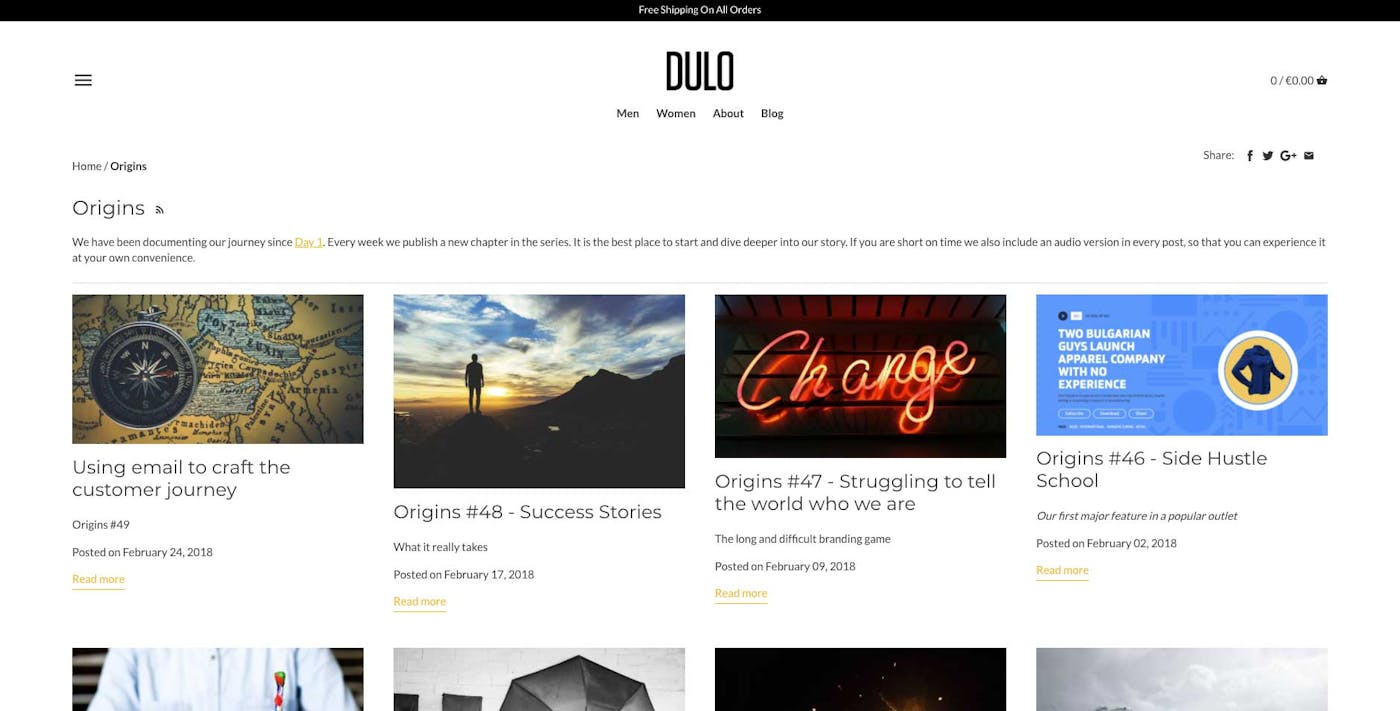
What are the biggest challenges you've faced and obstacles you've overcome? If you had to start over, what would you do differently?
In the beginning the one thing we were sure about was that we had a product. With an industry average return rate of 30%, we haven't yet had any returns (though we haven't shipped large quantities yet — about 70 shirts shipped so far). This was the plan all along: to have a very, very solid core of the business, which is the product itself.
Having said that, being in a good place technologically, now we need to focus on learning how to build a brand and leverage modern platforms to do so.
We had a very generic tone of voice in the beginning, talking to everyone, hence not talking to anyone. We'll be working on finding our own unique angle, own that, and create content around it. We started off going very wide, on many platforms, without any depth.
Many testers and people who've gotten their hands on the physical product have come back and ordered 3, 4, 5 shirts. Our biggest challenge will be to translate this success from a physical to a digital context. In other words, we'll focus on how to present and communicate that feeling on our website.
It's also kind of a new product category, so we will need to educate on the benefits of using advanced fabrics to create classic dress shirts and also present information about the possible environmental benefits (when a good manufacturing process is in place).
Have you found anything particularly helpful or advantageous?
Documenting our journey has been a big win. It's created an additional group of people who are interested in what we are doing, as well as a great pillar of content we can use for content marketing.
We've also been very lucky with our manufacturing partner. The quality standards, expertise, and eye for innovation compliment our lack of previous industry knowledge and experience (although we are learning!) very well.
I am very inspired by people and especially founders. Below are some people that I looked up to while building DULO.
- Jason and David from Basecamp. Exceptional example of running a self-sustaining business with common sense, putting people first and not necessarily pushing only for growth.
- Ryan Carson and Treehouse. An amazing mission that helped me get my first programming job, and we're especially proud to have Ryan as one of our first customers.
- Gary Vaynerchuk is a person who we look to for marketing and branding strategies, as well as practical business advice.
- Yvon Chouinard, CEO of Patagonia, and the way the company thinks about manufacturing and production, is a huge inspiration that we want to keep in mind when we produce our products, and do it in a responsible manner.
What's your advice for indie hackers who are just starting out?
There is no replacement for doing. I've been in Tim Ferriss binge listen mode, but at some point the rubber needs to hit the road and you need to get your hands dirty. Otherwise it's just productive procrastination.
I learned more about Facebook Ads by dedicating a weekend to experiment with it than I had for the previous months reading articles and listening to podcasts about it.
Be very precious about the product, but less so about content. Your product, or service, is the heart of your business. Make it the best it can be. As for content, on the other hand — don't cripple yourself looking for perfection. Ship it, move it, post it. It's all just data points and lessons to help you improve.
Don't be afraid to go into an industry/field you know nothing about. If you have the idea, vision, and discipline to execute it, rely on partners and build relationships with people that compliment your skill set. Bet on your strengths and create an environment where you can trust other people to cover your weaknesses.
We can sometimes get carried away with producing content, but there is as much value, if not more, in engaging with other people's content and creating one-on-one relationships, again to the point of depth vs width.
Trust your co-founder if you have one. Building a business alone is hard. Have complete trust in your teammates. If you are not feeling it, sort it out earlier rather than later.
Where can we go to learn more?
For an audio introduction about how we started DULO, check out our feature on Side Hustle School.
We've been documenting our journey from day one, so check out our Origins series. We post an update every week to share our experiences and learnings while building this business. For our newsletter you can sign up here.
We have a podcast where we talk to other small business owners. We'd love to have you on. Just drop us a line if you're building a business or a personal brand.
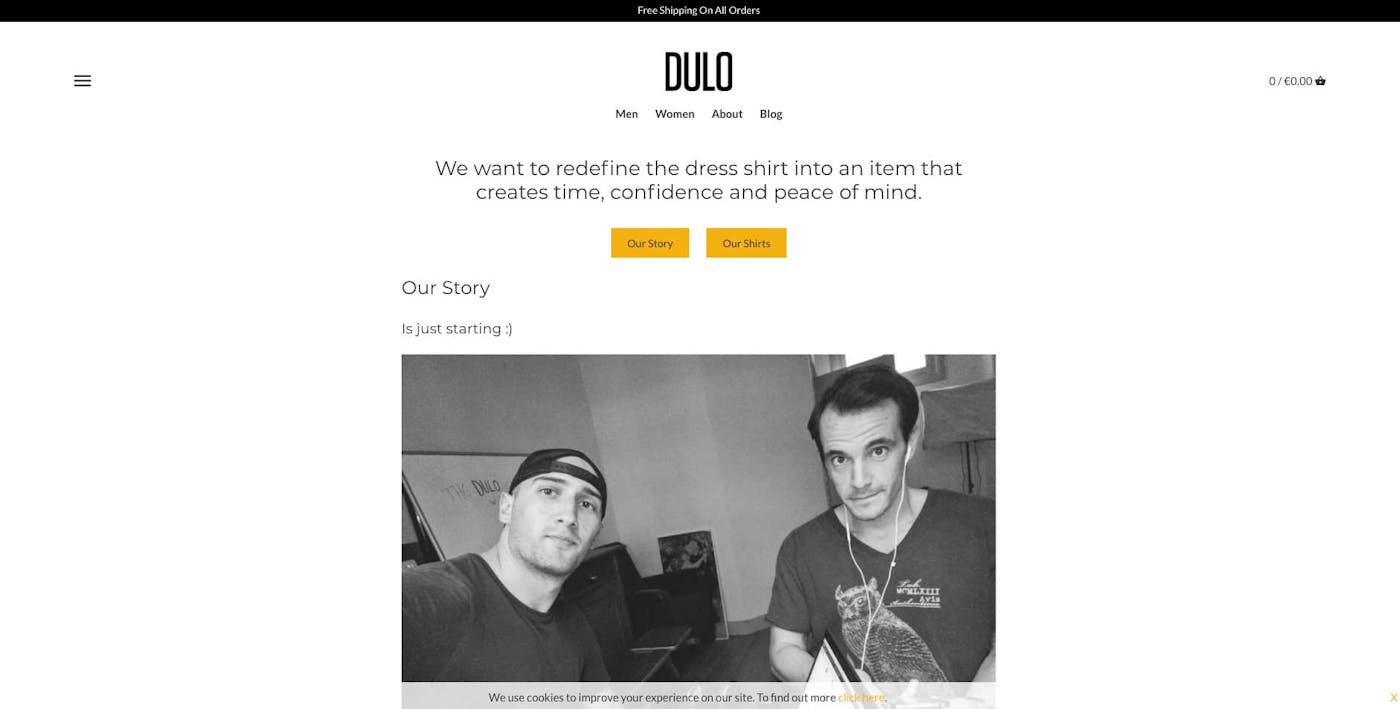
Our vlog is over at YouTube. We will soon start taking it seriously again.
For daily updates and active stories, follow us on Instagram.
We are big fans of the IH community and everyone who is working on their own thing. This is the message we want to promote by building and documenting our process. So. feel free to use the code "INDIEHACKERS" on our website for a 15 EUR off any purchase. We have free delivery worldwide.
We feed off questions. Please drop some below!

Julian - Love what you guys are doing. Cool idea to better the wrinkle free shirt. I've been thinking about doing something similar with making the ultimate mens t shirt that's long, made of great fabric, fits great and looks great. How did you guys go about finding the fabric mill that produced the prototype? I've been searching here in the US for fabric mills and/or vertically integrated clothing producers to see who can fabricate what I'm wanting to make.
Great to see that you are also thinking about entering the industry, Samuel!
We source and make everything in Europe and we have a manufacturing partner that does a great job in researching and finding high-quality technological fabrics. Drop me an email (julian@weardulo.com) and let me know what you are looking for, maybe I can get you in touch with someone who might be able to help you 👍
Love the product. It's immensely comfortable to wear! Cool podcast too!
Thanks @RomanPessarov <3
👋 Please drop any additional questions you might have regarding our company, process, product or anything else! Thank you for reading our story!
Hi Julian! Awesome post, it's really really helpful to read the process you guys went through. I'm just in the beginning of starting an outdoor brand with shirts, and other camping gear and I find it extremely difficult to find manufacturers who make small orders and at the same time are affordable. Do you guys have any advice or contacts for manufacturers within Europe? I'm looking to get 100% Polyester sports shirts made.
Thank you so much!
Cheers,
Melanie
Hey Melanie,
Thank you for the kind words!
I know exactly what you are going through :) We were lucky to find our manufacturing partner, he seems to be able to negotiate with fabric manufacturers :)
Drop me a line on julian@weardulo.com and I can give you his contacts directly, he might be able to help out 👍